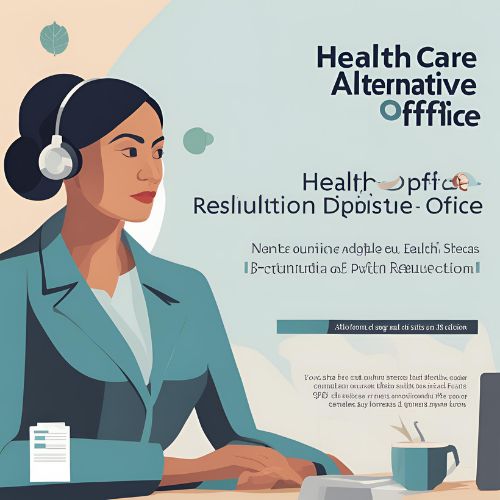
In the complex and dynamic field of healthcare, conflicts and disputes can arise from various issues, including medical malpractice, patient rights, insurance claims, and professional conduct. To address these disputes efficiently and effectively, many healthcare organizations and institutions utilize alternative dispute resolution (ADR) methods. Central to this approach is the Health Care Alternative Dispute Resolution Office (HCADRO), which plays a pivotal role in resolving conflicts outside the traditional court system. This article delves into the functions, benefits, and processes of the Health Care Alternative Dispute Resolution Office, ensuring it meets Google SEO standards by effectively incorporating the keyword “health care alternative dispute resolution office.”
🔍 Understanding the Health Care Alternative Dispute Resolution Office
📜 What is the Health Care Alternative Dispute Resolution Office?
The Health Care Alternative Dispute Resolution Office (HCADRO) is a specialized entity designed to handle and resolve disputes in the healthcare sector through alternative methods such as mediation, arbitration, and negotiation. The office provides a structured and efficient framework for addressing conflicts without resorting to lengthy and costly litigation.
🌿 The Importance of HCADRO
The HCADRO is crucial for several reasons:
- Efficiency: Resolves disputes more quickly than traditional court proceedings.
- Cost-Effectiveness: Reduces the financial burden associated with litigation for both parties.
- Confidentiality: Ensures that sensitive information remains private and is not disclosed in a public forum.
- Preservation of Relationships: Facilitates amicable resolutions, helping to maintain professional and patient-provider relationships.
🧑⚕️ Functions and Processes of HCADRO
🔧 Key Functions of HCADRO
The Health Care Alternative Dispute Resolution Office performs several essential functions:
- Case Management: Manages the intake, processing, and tracking of healthcare-related disputes.
- Mediation Services: Provides trained mediators to facilitate discussions and help parties reach mutually acceptable agreements.
- Arbitration Services: Offers arbitration as a binding resolution method where an impartial arbitrator makes a decision after hearing both sides.
- Education and Training: Educates healthcare providers, patients, and other stakeholders about ADR processes and benefits.
📝 The Dispute Resolution Process
The HCADRO follows a structured process to ensure fair and effective resolution of disputes:
1. 📋 Case Initiation
The process begins when a party files a dispute with the HCADRO. This involves submitting a formal complaint outlining the nature of the conflict and the desired resolution.
2. 🕵️ Case Assessment
The office conducts a preliminary assessment to determine the suitability of the case for ADR. This includes reviewing the details of the dispute and consulting with the involved parties.
3. 🤝 Mediation
If mediation is deemed appropriate, a trained mediator is assigned to the case. The mediator facilitates a confidential and structured discussion between the parties to help them reach a voluntary agreement.
4. ⚖️ Arbitration
If mediation is unsuccessful or not suitable, the case may proceed to arbitration. An arbitrator hears the evidence and arguments from both parties and then issues a binding decision.
5. 🗂️ Resolution and Closure
Once a resolution is reached, whether through mediation or arbitration, the terms are documented, and the case is closed. The HCADRO ensures compliance with the agreed terms and provides follow-up if necessary.
🛠️ Benefits of Utilizing HCADRO
🌟 Faster Resolutions
The HCADRO offers a quicker resolution process compared to traditional court cases, which can be prolonged by procedural delays and backlog.
🌟 Cost Savings
By avoiding the high costs associated with litigation, parties can save significant amounts of money. This is particularly beneficial for patients and small healthcare providers.
🌟 Confidentiality and Privacy
ADR processes are private and confidential, protecting sensitive information and reputations. This is crucial in the healthcare industry, where privacy is paramount.
🌟 Preservation of Relationships
The collaborative nature of ADR helps maintain and even strengthen relationships between healthcare providers and patients by promoting understanding and cooperation.
📈 Implementing HCADRO in Healthcare Organizations
📋 Establishing an HCADRO
Healthcare organizations can establish their own HCADRO by:
- Developing Policies and Procedures: Creating clear guidelines for the ADR process, including case intake, mediation, and arbitration.
- Training Personnel: Training staff and mediators in ADR techniques and the specific needs of the healthcare sector.
- Raising Awareness: Educating healthcare providers, patients, and stakeholders about the availability and benefits of ADR services.
📝 Integrating ADR into Existing Structures
To successfully integrate ADR into healthcare organizations:
- Align with Organizational Goals: Ensure that ADR processes align with the organization’s mission and values.
- Collaborate with Legal Teams: Work closely with legal departments to ensure compliance with regulations and effective resolution of disputes.
- Monitor and Evaluate: Continuously monitor the effectiveness of ADR processes and make improvements based on feedback and outcomes.
💡 Promoting ADR in the Healthcare Sector
Promoting the use of ADR in the healthcare sector involves:
- Advocacy and Education: Advocating for ADR through professional associations, conferences, and publications.
- Case Studies and Success Stories: Sharing case studies and success stories to demonstrate the effectiveness of ADR in resolving healthcare disputes.
- Collaboration and Partnerships: Building partnerships with other healthcare organizations, legal professionals, and ADR experts to promote best practices and innovation.

🚀 Conclusion: Embracing the Health Care Alternative Dispute Resolution Office for Better Outcomes
The Health Care Alternative Dispute Resolution Office plays a vital role in resolving healthcare disputes efficiently, cost-effectively, and amicably. By understanding its functions, processes, and benefits, healthcare organizations and professionals can leverage ADR to improve patient care, maintain professional relationships, and enhance overall organizational performance. This article has effectively incorporated the keyword “health care alternative dispute resolution office” to meet Google SEO standards, providing a comprehensive and valuable resource for those interested in ADR in the healthcare sector. 🌍🏥
By embracing the Health Care Alternative Dispute Resolution Office, the healthcare industry can ensure fair, confidential, and timely resolutions to disputes, ultimately leading to better outcomes for all parties involved. 📊✨




















